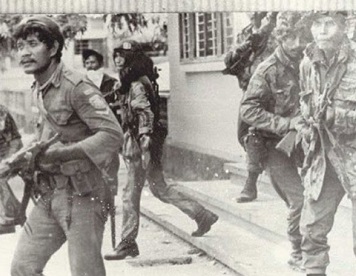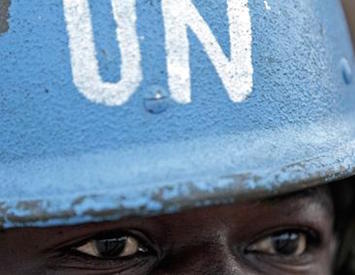Dr Adam Henry discusses newly released documents exposing self-righteous and dispassionate attitudes of Australian diplomats during the war in 1970s East Timor.
Part 1
THE RECENT UNEARTHING of Australian diplomatic documents – by Monash University academic researchers Sara Niner and Kim McGrath – containing written annotations by Australian diplomats in Jakarta (November 1976), has brought back into the light an unresolved dark chapter in Australian history.
A named recipient of the memo, Peter Rogers, now enjoying post diplomatic retirement as a resident expert at the Australian National University, has not confirmed if he is one of the annotators. Another former diplomat Cavan Hogue at least concedes some of the annotations look like his handwriting.
Highlighted in bold are sections from an article Hogue wrote in 2006:
Then there is the realist view that we do not want unstable entities close to our borders because they might be used by terrorists or enemies or adversely affect our interests in other ways. Interestingly, this was the reason given by Indonesia for their intervention in East Timor in 1976.
No doubt this intervention prevented the kind of ethnic and political based violence we are seeing now but their main reason was to prevent Timor being ruled by an unstable Communist government (Fretilin).
As Xanana Gusmao has recently pointed out, the Fretilin leadership is undemocratic and not averse to bloodshed. (The fact that incompetence, cruelty and corruption by TNI later lost the hearts and minds of the people does not alter the motivation for Indonesian intervention.
The attitude expressed in the written annotations and the 2006 article (which largely spoke about the possibilities of so called security interventions in our region) do not "surprise" me in regards to the mentality at the highest levels of our diplomatic corps to such issues. Nor do the email excuses of Peter Rogers, which he sent to journalist Tom Allard in order to spin away the sheer callousness of the written annotations.
When I read the Hogue 2006 article – and looked again at the context of the annotations – some thoughts percolated.
First, was Hogue’s juxtaposition of East Timor during 1975 with the political upheavals of 2006. Hogue makes no mention whatsoever of the possible role that Australia might have played in exacerbating political conflict in Timor Liste at that time. The inference appears to be that the East Timorese are not really capable of self-government.
Hogue’s attitude is rather extraordinary given the information available on the 1975 period and beyond (in light of the archives in Australia alone), and that numerous examinations of the issue reveal a near total indifference to Indonesian human rights abuses and crimes in Timor Liste.
Richard Woolcott (Australian Ambassador to Indonesia) even advised Whitlam (in the wake of the Balibo executions) that the Javanese simply did not value human life the same way they "we" do. In light of the official Australian silence to its own murdered citizens and its indifference to the suffering and loss of life of the Timorese from the very beginning, one can at least take some satisfaction that Woolcott’s unique logic will be on the public record for all time.
The justification for the Indonesian invasion – advanced by Richard Woolcott and others and trotted out by Hogue – should be greeted with historical contempt. It was never more than a smokescreen, a cover story — even Whitlam (the main architect of Australian diplomatic complicity over East Timor in 1975) is eventually recorded by the diplomatic archives as being dismissive of any outside forces wanting to interfere in East Timor in his correspondence with Suharto prior to the illegal invasion.
The other question worth considering is how Hogue can know the innermost "motivations" of the Indonesian military in 1975 – or is it merely the case that because they said it privately to the Australian Embassy in Jakarta (and then used it publicly as a cover story) – then this becomes a "legitimate motivation"?
It should be noted that the Australian Embassy in Jakarta (under Woolcott as Ambassador), and where Hogue worked in 1976, had a close relationship with key Indonesian military and intelligence figures. Perhaps this past connection is why Hogue feels able to speak with such authority about Indonesian military motivations?
The Indonesian policy of armed takeover resulted almost at once in multiple contraventions of international law, blatant human rights abuses on a smaller scale (executions), then killing and death on a grand scale right across the territory. The wreckage from this train of consequences being known to the Australians through intelligence assets (signals primarily) and its foreign service, almost in real time or very shortly after each notable event.
In fact, Hogue’s logic is worth examining closely given its hidden message. It firstly implies that the Indonesians had a legitimate motivation or good reason to mount their military takeover of Portuguese Timor. So, if you have the means, motivation and the opportunity, then it is apparently acceptable to wage a "war of aggression" against a near defenceless territory and its people.
It was this attitude (in conjunction with diplomatic and economic opportunism) that later enabled Australia to enter into maritime boundary negotiations with the occupying power in order to secure oil and gas concessions – the so called Timor Gap – while the occupation and human rights abuses continued on a daily basis. The other attitude advocated by the pro-Jakarta lobby was that the Indonesian military occupation was permanent and there were no alternatives — independence was irresponsible, so we just had to get on with the diplomatic relationship.
If we had ever relentlessly pursued the cause of international law and campaigned against human rights abuses (at home and in the international system), in any manner that was half as determined as the approach to the Timor Gap – in ignoring human rights abuses committed by the Indonesian military or in ingratiating ourselves with Suharto – all Australian diplomacy toward Timor Liste would be a source of principled example, not "newspeak".
We might pause here and consider a very different and self-righteous attitude of the current Australian Government (all shrouded in the language of international law, human rights and the principled morality of opposing force) toward China in the current dispute in the South China Seas, or Russia in the Ukraine or Syria, for example.
There is ample evidence that the very worst of the political "instability" in 1974 to 1975 was a natural result of the collapse of Portuguese colonial authority, the vacuum this left and an Indonesian destabilising program (within and outside the territory). This operated for months prior to the invasion, doing all it could to undermine the eventual alliance between the independence parties (Fretilin and UDT), create pro-Indonesian front organisations such as the Anpodeti party — encouraging discord and conflict.
This was to provide the context for Indonesian military conquest of East Timor — an "intervention" to restore order. The fact the Whitlam Government refused to provide assistance, participate in mediation and had rejected even the notion of actual independence for Portuguese Timor, only made matters worse for the people of East Timor.
There is voluminous information on this topic, yet one still cannot go past Timor: A People Betrayed, by former Australian diplomat James Dunn. We also now have the enormous CAVR report which details all of this in painstaking detail. One area of note here is that Fretilin, Catholic Church, NGO "propaganda" about the Indonesian military in East Timor was highly accurate. The classified intelligence estimates and analysis within the then DFA (often, as I understand, gathered through sources such as Defence Signals and filtered throughout the highest echelons of Australian foreign policy establishment) on what the TNI were doing in East Timor surely must have mirrored these non-government assessments in the 70s, 80s and 90s. It would have been an extraordinary failure of Australian intelligence if they did not.
But perhaps, just perhaps, no one was ever going to do anything about this. Yet this pro-independence, or even racist anti-Indonesian "propaganda" (yes, the pro-Suharto lobby played this card too) was attacked publicly and shamelessly throughout many years by many in the pro-Suharto clique — including high ranking members and former members of the foreign service, Woolcott, Whitlam, Evans, Keating et al continuing right down the line until 1999 and beyond). There are "information warfare" advantages in mounting such public commentaries attacking East Timorese support groups, the Timorese Catholic Church, and NGOs, when the detailed intelligence assessments about the war crimes and human rights abuses committed by our friends remain classified and not publicly available. The pattern regarding West Papua is virtually verbatim.
Without U.S. support at the highest echelons the Indonesian military never would have invaded the territory. There was British and particularly Australian encouragement for the idea of Indonesian sovereignty over East Timor. Yet military operations were unable to crush the Timorese nationalist resistance by late 1976 and there were U.S. fears that the Indonesian military could "fail" in East Timor — the British and Americans resupplied them with weapons and the Australians (after the briefest flirtation with conscience under Fraser), quickly came to their senses and continued all they could do to protect their relationship with Suharto.
All of this U.S., UK and Australian support could only have been useful to Suharto before, during and after the invasion, the famine it exacerbated (if not caused) by criminal military strategies carried out under his authority and the ongoing occupation. Systematic human rights abusers in such an Orwellian scenario could only be emboldened with a total sense of impunity. Australia has done next to nothing to support any notion of legal retribution under international law for what occurred in East Timor.
Coming soon: Part 2
Dr Adam Hughes Henry is a visiting fellow at the School of Culture, History and Language at the Australian National University. You can read more from Dr Hughes on his website.

This work is licensed under a Creative Commons Attribution-NonCommercial-NoDerivs 3.0 Australia License
Monthly Donation
Single Donation
Be informed. Subscribe to IA for just $5.









